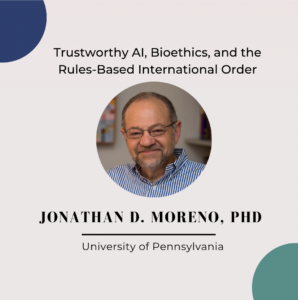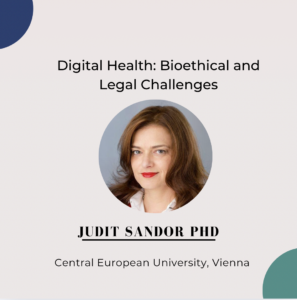2025 Winter School Online
Keynote Speakers

Jonathan D. Moreno PhD is the David and Lyn Silfen University Professor at the University of Pennsylvania, where he is a Penn Integrates Knowledge (PIK) professor. At Penn he is also Professor of Medical Ethics and Health Policy, of History and Sociology of Science, and of Philosophy. His most recent books are Everybody Wants to Go to Heaven but Nobody Wants to Die: Bioethics and the Transformation of Healthcare in America, co-authored with Penn president Amy Gutmann; and The Brain in Context: A Pragmatic Guide to Neuroscience, written with neuroscientist Jay Schulkin. Among Moreno’s previous books are, The Impromptu Man: J.L. Moreno and the Origins of Psychodrama Encounter Culture and the Social Network and The Body Politic which was named a Best Book of 2011 by Kirkus Reviews; Undue Risk, nominated for the Virginia Book Award; and Mind Wars, which was referenced by the screenwriter of The Bourne Legacy. He has published more than a thousand papers, articles, reviews and op-eds. Moreno’s writings have been translated into German, Japanese, Korean, Portuguese and Romanian. Moreno is senior consultant to a six-year, 10 million euro project on cold war medical science on both sides of the iron curtain, funded by the European Research Council. Moreno’s op eds have been published in venues including The New York Times, The Wall Street Journal, Science, Nature, Slate, Politico, The Hill, Foreign Affairs, Axios.com, The Huffington Post, and Psychology Today. He often appears on broadcast and online media. He was co-host of Making the Call, an Endeavor Content podcast and was a columnist for ABCNews.com. Formerly Moreno was a senior fellow at the Center for American Progress in Washington, DC. and editor of the online magazine Science Progress. The American Journal of Bioethics has called him “the quietly most interesting bioethicist of our time.” Moreno is an elected member of the National Academy of Medicine. He has served as a staff member or adviser to many governmental and non-governmental organizations, including the UNESCO International Bioethics Committee, three U.S. presidential commissions, the Department of Defense, the Department of Homeland Security, the Department of Health and Human Services, the Centers for Disease Control, the Federal Bureau of Investigation, the Howard Hughes Medical Institute, and the Bill and Melinda Gates Foundation. In 2008-09 he served as a member of President Barack Obama’s transition team. Moreno received his Ph.D. in philosophy from Washington University in St. Louis, was an Andrew W. Mellon post-doctoral fellow, holds an honorary doctorate from Hofstra University and is a recipient of the College of William and Mary Law School Benjamin Rush Medal, the Dr. Jean Mayer Award for Global Citizenship from Tufts University, and the Penn Alumni Faculty Award of Merit. He has held the honorary Visiting Professorship in History at the University of Kent in Canterbury, England. In 2018 the American Society for Bioethics and Humanities presented him with its Lifetime Achievement Award. Jonathan D. Moreno, PhD
Absolutely Essential: Bioethics and the Rules-Based International Order
In my new book Absolutely Essential, I explore the field of bioethics as both a creature and a key element of the post–World War II rules-based order. According to this order, international relations are to be organized according to principles of open markets, liberal democracy, and multilateral organizations. In the book I raise key questions about the future of bioethics in a changed world order, while also theorizing new ways to think about bioethics after the COVID-19 pandemic and the reordering of global alliances.

Judit Sandor PhD is a full professor at the Faculty of Political Science, Legal Studies and Gender Studies of the Central European University (CEU), Budapest. She had a bar exam in Hungary she conducted legal practice at Simmons & Simmons in London, had fellowships at McGill (Montreal), at Stanford (Palo Alto), and at Maison de sciences de l’homme (Paris), at NYU (New York, as a Global Research Fellow). In 1996 she received Ph.D. in law and political science. She was one of the founders of the first Patients’ Right Organization (‘Szószóló’) in Hungary, she was a member of the Hungarian Science and Research Ethics Council, and currently a member at the Hungarian Human Reproduction Commission. She participated in different national and international legislative, standard setting and policy making activities in the field of biomedical law and bioethics. In 2004-2005 she served as the Chief of the Bioethics Section at the UNESCO. She published seven books in the field of human rights and biomedical law. Her works appeared in different languages, including Hungarian, English, French and Portuguese. Since September 2005 she is a founding director of the Center for Ethics and Law in Biomedicine (CELAB) at the Central European University. She has completed ten European research projects (including: GeneScreen, PUG, STRATA-ETAN GROUP, GeneBanC, PRIVIREAL, PRIVILEGED, Tiss.Eu, RemediE, EULOD, NANOPLAT), founded by the European Commission in the field of biobanks, genetic data, stem cell research, organ transplantation and human reproduction. In 2014-2016 she worked at the NERRI and the EUCElLEX Projects. In 2017 she participated at the HURMUR Project and continued her work also within the IANB network, co-ordinated by the University of Rennes. In 2017-2020 she served also at the ESOF Programme Committee with the mission of organizing the Euroscience Open Forum to be held in Toulouse and in Triest. In 2019 she received the prestigeous ERC Synergy Grant with the “Leviatahan”project.
Digital Health: Bioethical and Legal Challenges
The use of artificial intelligence in health care creates many new challenges, therefore bioethics needs a more nuanced analysis in designing the normative framework for the regulation of health care applications of AI solutions. While artificial intelligence may enhance accuracy in medical diagnosis and therapies, one could reasonably foresee that the right to healthcare and the right to personalized care might be interpreted very differently in the future. For example, effective healthcare could be provided with the assistance of technology, but it may also mean that Ai-based precision medicine will not necessarily offer personal services as before. If patients are replaced by digital data in biomedical research, it will make it easier to handle huge medical databases. However, small errors may be amplified and create complex liability cases. Communication, which is also a basic element of the classical patient–doctor relationship, will also be altered when a chatbot acts as an interface and laboratory tests are interpreted by artificial intelligence instead of humans. This would presuppose much more autonomy and knowledge on the patient side, as well. Emerging technologies are often regarded as transformative technologies. Nevertheless, the way advanced technologies transform our life is not predetermined by the invention itself, but by careful and sensitive implementation, which is a multidisciplinary work and requires the engagement of society.
